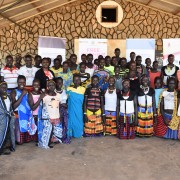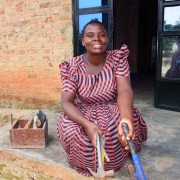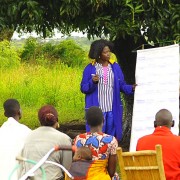Speeches Shim

As a young girl in rural Karamoja, 18-year-old Regina Nadim never went to school. “My parents could not afford school fees,’’ Regina says. "They only saw me as a source of labor and a dowry. There was no one to help me, and it was difficult to find odd jobs."

Merab Namiwanda is an instructor at Ssanje Community Polytechnic Institute and a professional plumber. The mother of four attended a mason training conducted by USAID’s Uganda Sanitation for Health Activity in Kyotera, which demonstrated an improved sanitation product called SATO. SATO products are plastic devices distributed in Uganda by Nice House of Plastics on behalf of the Japanese company Lixil; they use a trap door to seal off toilets when not in use and provide a washable floor and hygienic experience for the user. Merab quickly grasped the benefits, including eliminating flies and odors from the toilet. Immediately after the training, she installed two SATO pans at her home.

In Uganda, only 17 percent of the population has access to improved sanitation. Even though almost 80 percent of households are reported to have some form of toilet, the quality of these facilities is often very poor, and expose Ugandans to diseases. Inadequate sanitary conditions at households, schools, and health centers cost the country the equivalent of USD$177 million per year in lost productivity and medical costs. Sanitation, therefore, remains a shared responsibility. Masons like Abeed Gabunga play a significant role in ensuring quality workmanship for improved sanitation.

In the village of Okalis in Soroti district in Eastern Uganda, 20-year-old Lucy Akello looks at her baby and smiles. This is her first child, and when the baby smiles back she cannot hide her joy. “I am glad I can smile and have my child in my arms. I did not think it was possible. The nine months that led to the birth of my baby were tough,” Lucy recounts. “We had not planned to have a child yet. We were struggling financially, we had nothing. Going to hospital to have our baby would have been impossible without the voucher.”

At the age of 14, Annet Amony and her siblings were among what is now commonly known as “night commuters,” children who walked long distances from their villages to towns in search of a safe place to sleep, just to walk back the next morning. In the 1990’s, Northern Uganda was the battleground for a war between Uganda’s government and the Lord’s Resistance Army (LRA); villages were not safe - especially at night. Young girls were abducted and forced to become wives and slaves, while young boys were forcefully recruited as child soldiers. UNICEF estimates that over 40,000 children were routinely commuting at night to local towns in Northern Uganda in search of somewhere safe to sleep.

Comment
Make a general inquiry or suggest an improvement.